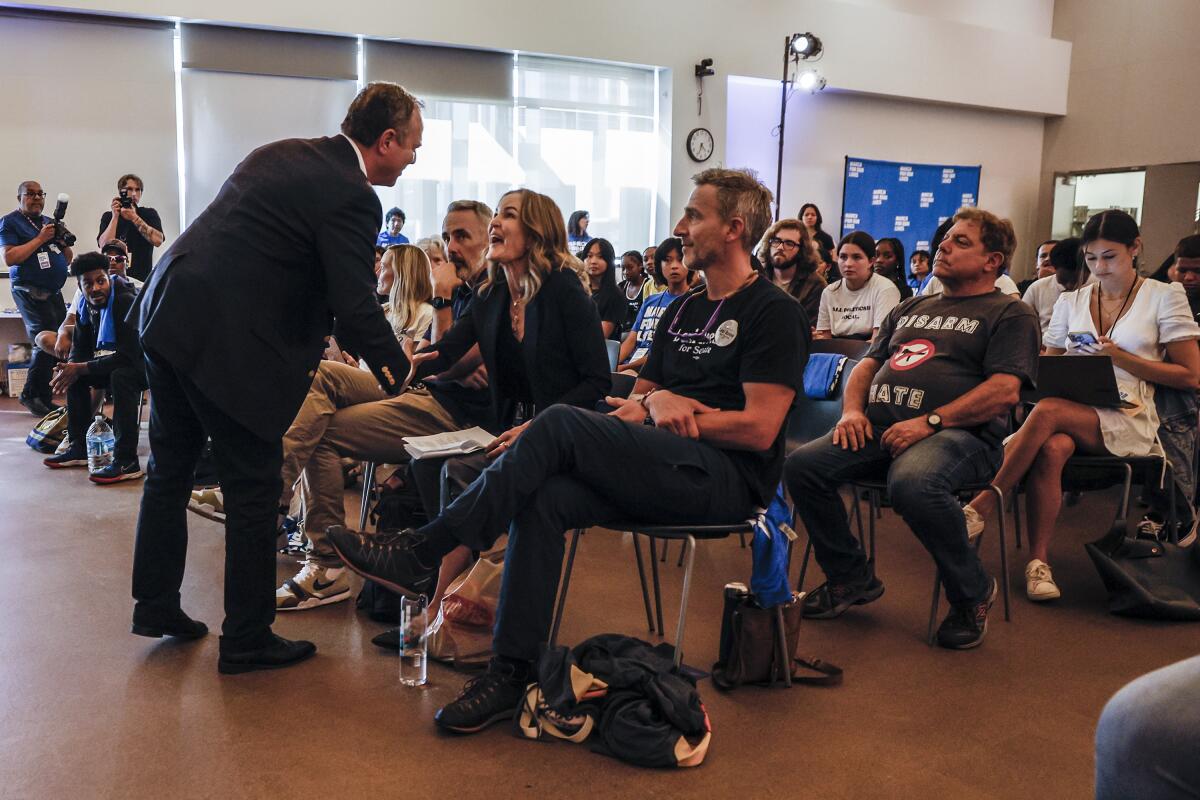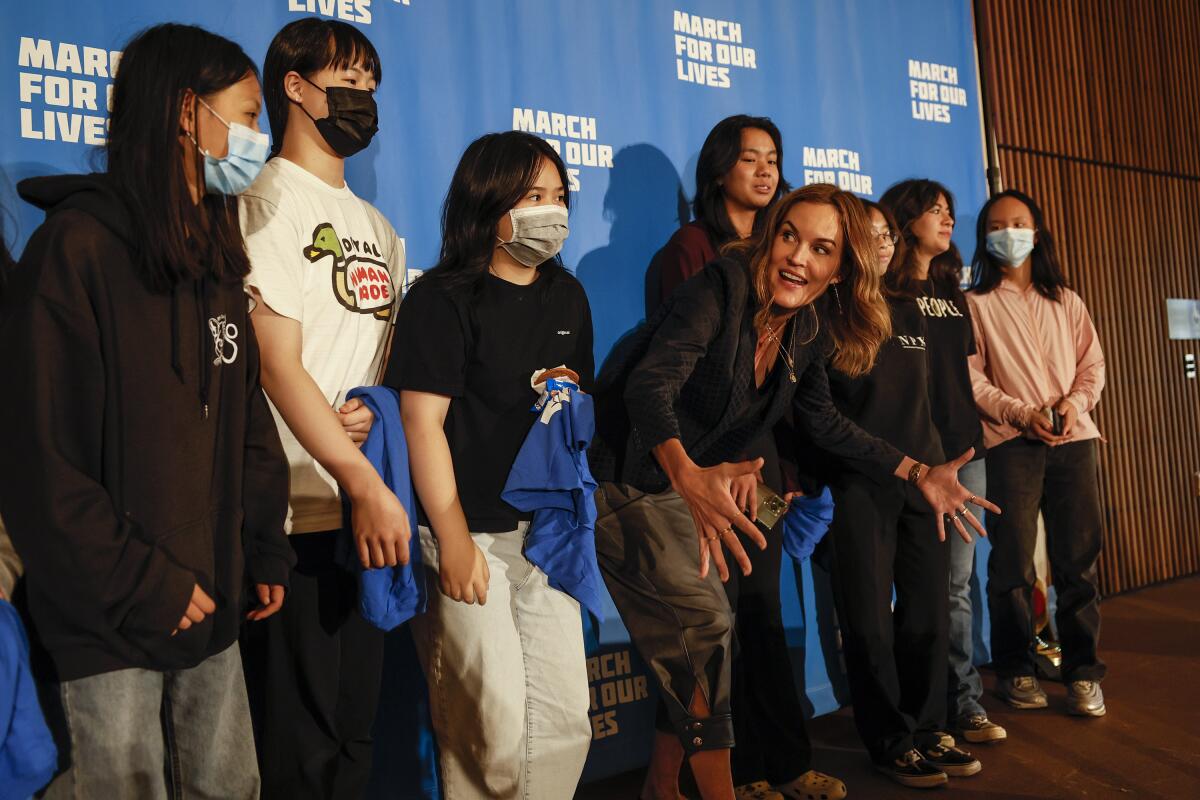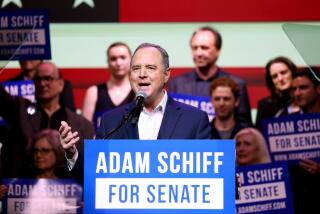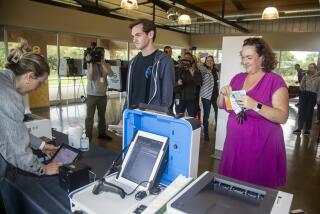In city scarred by January mass shooting, California Senate candidates push for tighter gun laws

- Share via
Just few miles from the site of the fatal mass shooting in Monterey Park, four top Democratic candidates running for Dianne Feinstein’s Senate seat told a youthful crowd Friday that making progress on the national scourge of gun violence will require changes in Congress.
Reps. Adam Schiff of Burbank, Katie Porter of Irvine and Barbara Lee of Oakland and Silicon Valley executive Lexi Reese spoke for about 90 minutes at a town hall discussion organized by March For Our Lives, the youth-led movement that emerged from the 2018 shooting at Marjory Stoneman Douglas High School in Parkland, Fla., that left 17 people dead.
David Hogg, who was among the students who survived the Parkland school shooting and is the co-founder of March For Our Lives, said he wanted to see “a bold gun-safety policy platform that speaks to us and involves us in the process, and that will safeguard the future.”
All four candidates are running to replace Feinstein, who has been a fierce advocate for tightening the nation’s gun laws since first being elected to the Senate in 1992.
Feinstein, 90, remains frail after being hospitalized earlier this year with shingles and is not seeking reelection in 2024. The San Francisco Democrat will leave behind a Senate legacy that includes key roles in enacting the nation’s only assault weapons ban and efforts to reinstate it after its expiration in 2004.
The town hall was held at East Los Angeles College in Monterey Park, the suburb where 11 people were killed in a mass shooting in January during a Lunar New Year celebration.

No Republican candidates for Senate were included. A March For Our Lives spokesman said the organization only invited candidates who raised more than $1 million by June 30. Republican attorney Eric Early, who launched his campaign in April, did not meet the threshold.
The clearest takeaway was how closely aligned the four Democratic candidates are on the need for more funding for mental health services and stronger federal protections against gun violence — not a major revelation, since the majority of California’s left-leaning electorate supports tougher gun laws.
In Congress, Schiff, Porter and Lee have all supported bills that would tighten requirements to buy firearms, and all three are members of the House Gun Violence Prevention Task Force.
“There’s no issue that angers me more than this one, because the answer is so damn obvious,” Schiff said during the town hall. “We just need a few more people in the office that have the guts to take on the gun industry, and have the guts to take on the NRA, and get the job done.”
Most efforts in Congress to pass new gun control laws have failed, including bipartisan bills introduced after some of the deadliest shootings in the nation’s history.
In 1999, after the Columbine High School shooting, a measure to close loopholes in the federal background check law for gun buyers passed the Senate and failed in the House. A bipartisan bill to strengthen criminal background checks for gun buyers failed in the Senate after the 2012 Sandy Hook shootings. And after the 2017 Las Vegas shooting, the deadliest in U.S. history, a bipartisan bill to ban bump stocks — which allow semiautomatic rifles to fire hundreds of rounds per minute — stalled in the House.
Too many members of Congress are cowards, Schiff said, “utterly beholden to the special interests. ... And their cowardice is killing people.”
Schiff has repeatedly sought to roll back a 2005 law that largely protects gunmakers, dealers and distributors from being sued in civil court.
He also has co-sponsored bills that would require background checks for most gun sales and extend the time that the FBI is allotted to complete background check investigations for firearm purchases. Schiff also voted against allowing a national conceal-carry law in 2017, which passed the House but stalled in the Senate.
After Schiff’s comments, a lone audience member shouted that none of his ideas would work “in the real world.”
Reese, the only candidate at the town hall who has not held elected office, said she is running for the Senate to reduce gun violence. She said she was held at gunpoint 16 years ago in another country, and “breathed a sigh of relief” after getting home to the U.S., a sense of safety that she said young Americans no longer have.
Reese, a former technology executive in Silicon Valley, unveiled a six-point plan to end gun violence, including giving the Consumer Product Safety Commission the power to oversee firearm safety. She said the body should “issue a massive recall” for guns without smart technology designed to shut down the firearms within 15 square miles of schools and civic gatherings.
Lee has co-sponsored multiple bills calling for stronger background check laws and barring the sale of some firearms to those under 21. She also pushed three times, unsuccessfully, to repeal the so-called Tiahrt Amendments, current laws that limit the use of firearms tracing data to law enforcement agencies and prosecutors investigating crimes, and which require that records of criminal background checks for gun purchases be destroyed within 24 hours.
Last year, Lee also urged Health and Human Services Secretary Xavier Becerra to declare a public health emergency for gun violence.
Lee said she wanted to see more investment in community organizing, mental healthcare services and violence intervention workers, telling the crowd: “The people closest to the pain should be closer to the power.”

Porter was among the co-sponsors for bills proposing federal rules for gun storage, authorizing funding for the CDC to study gun violence prevention, and closing the “ghost guns” loophole that allows buyers to avoid background checks when buying nonassembled firearms online. All three bills stalled in the House, though Congress later began funding firearm injury prevention research again after a nearly 25-year hiatus.
“There’s no doubt that our heart breaks in a particular way when it is a kid, when it is a school,” Porter said of gun violence in the U.S. “But the truth is, we’re not safe anywhere, because we don’t have gun safety policies that keep us safe everywhere.”
During three decades as a senator, Feinstein was a consistent and vocal advocate for federal gun reform.
In 1978, Feinstein was at her office in San Francisco City Hall when former county supervisor Dan White walked into the building and fatally shot Supervisor Harvey Milk and Mayor George Moscone. Feinstein, the president of the board of supervisors, was the first to find Milk’s body and became mayor after Moscone’s death.
In 1993, less than a year after Feinstein was elected to the Senate, a gunman killed eight people and wounded six others inside a San Francisco high-rise office building. The mass shooting is still the deadliest in the city’s history.
Feinstein cited the shooting as she authored and advocated for the Federal Assault Weapons Ban, which banned the manufacture, import and sale of some types of semiautomatic weapons and ammunition magazines containing more than 10 rounds. The bill, signed into law in 1994, was the first major effort by Congress to stem the flow of guns in the U.S. since the 1968 assassinations of Robert F. Kennedy and Martin Luther King Jr.
Congress allowed the bill to expire in 2004. Initial studies about the ban’s effect, including from the Justice Department, were mixed. More recent research has suggested that the ban did make a difference, at least in mass shootings. (The vast majority of U.S. gun violence involves handguns, not assault-style weapons.) Stanford University researchers found a 25% drop in mass shootings and a 40% drop in fatalities during the decade that the ban was in effect, compared to the 10 years prior.
Feinstein has tried repeatedly to resuscitate the ban, including after the attempted assassination of then-Rep. Gabrielle Giffords in 2011, and, most recently, after the Monterey Park shooting left 11 people dead.
When the Senate voted down a proposal to attach the assault weapons ban to a broader gun-control bill a few months after the Sandy Hook shooting, Feinstein told her colleagues: “Show some guts.”
More to Read
Sign up for Essential California
The most important California stories and recommendations in your inbox every morning.
You may occasionally receive promotional content from the Los Angeles Times.











